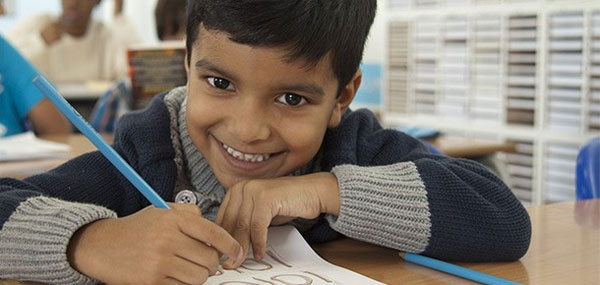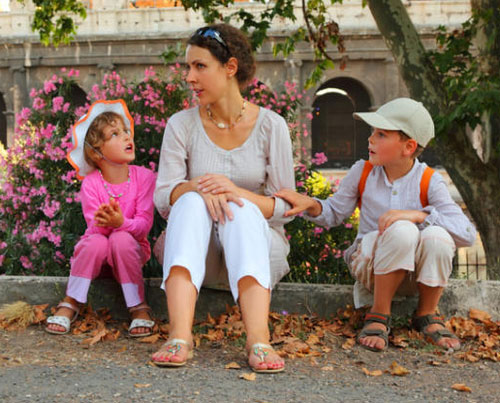A child learns best at his mothers knee. Here are some tips on how you can educate your child at home until he reaches the age of four. A few days ago when I visited to a friends house, I was surprised to see that she was alone. Her two and a half year old was conspicuous by his absence. When I enquired about him, she answered that she had sent him to school. I was dumbfounded. "But he is hardly two and a half years old!" I exclaimed. Sending children to play school or day care is justified when the mother is working, but since my friend is a homemaker, I couldnt understand why she felt she had to send him off to school at this young age. She then said she had no idea as to what she should teach him at home, and so had sent him to school. Having successfully home-schooled two kids until they attained the age of four, I would like to share some tips a propos home-schooling. In this articleBooksActivitiesPractical learningStoriesSkillsBooks In the mornings after your husband leaves for work, set aside a few hours aside to spend with your toddler. After a refreshing bath and a nutritious breakfast, start by flipping through picture books. Point out pictures and let your child know what each picture signifies. Dont worry about him repeating after you. The mind of a young child is like a sponge and constantly absorbs information. Within a few days you will notice an improvement in your childs ability to recognize and name images. Slowly, you can graduate to colours, and then, numbers. Activities The attention span of children is very limited, so take the cue from your childs behavior and move on to the next activity as soon as he becomes restless. Plan a separate activity for each day. One day you could string beads, another day, play with the play doh, yet another day make simple crafts with color paper and glue, and so on. With a few colored chart papers, glue and even pencil shavings you and your budding artist can create some very interesting wall-hangers. Practical learning Shapes can be taught using different biscuits and the concept of more and less can be taught with a glass of milk. Ascending and descending orders can be explained with the help of a staircase. This would not only help children to grasp concepts easily but will also help them apply their knowledge to everyday life situations. Rhymes can be taught with the help of audiocassettes. Stories Conclude each session with a story. Care should be taken to see that you dont push your child too hard in an effort to make him learn more. Psychologists often talk about the possible long-term damage done to the psyche and intellect by forcing young brains to master tasks they are not ready for. Let your instincts guide you to guide your child. Its proper that education should begin in the cradle, but in an interesting atmosphere. Skills As parents we have to teach age-appropriate skills to our kids. Tying the shoelace, buttoning up the shirt, filling the water bottle etc are certain life-skills that can be taught to very young children. To fine-tune his social skills, take him to local parks in the evenings where he is sure to meet kids of his age. All you need to home school your child until the age of four is patience and imagination. But what you get in return is great bonding and enormous satisfaction.
A child learns best at his mother's knee. Here are some tips on how you can educate your child at home until he reaches the age of four. A few days ago when I visited to a friend's house, I was surprised to see that she was alone. Her two and a half year old was conspicuous by his absence. When I enquired about him, she answered that she had sent him to school. I was dumbfounded. "But he is hardly two and a half years old!" I exclaimed. Sending children to play school or day care is justified when the mother is working, but since my friend is a homemaker, I couldn't understand why she felt she had to send him off to school at this young age. She then said she had no idea as to what she should teach him at home, and so had sent him to school.
Having successfully home-schooled two kids until they attained the age of four, I would like to share some tips a propos home-schooling.
Books
In the mornings after your husband leaves for work, set aside a few hours aside to spend with your toddler. After a refreshing bath and a nutritious breakfast, start by flipping through picture books. Point out pictures and let your child know what each picture signifies. Don't worry about him repeating after you. The mind of a young child is like a sponge and constantly absorbs information. Within a few days you will notice an improvement in your child's ability to recognize and name images. Slowly, you can graduate to colours, and then, numbers.
Activities
The attention span of children is very limited, so take the cue from your child's behavior and move on to the next activity as soon as he becomes restless. Plan a separate activity for each day. One day you could string beads, another day, play with the play doh, yet another day make simple crafts with color paper and glue, and so on. With a few colored chart papers, glue and even pencil shavings you and your budding artist can create some very interesting wall-hangers.
Practical learning
Shapes can be taught using different biscuits and the concept of more and less can be taught with a glass of milk. Ascending and descending orders can be explained with the help of a staircase. This would not only help children to grasp concepts easily but will also help them apply their knowledge to everyday life situations. Rhymes can be taught with the help of audiocassettes.
Stories
Conclude each session with a story. Care should be taken to see that you don't push your child too hard in an effort to make him learn more. Psychologists often talk about the possible long-term damage done to the psyche and intellect by forcing young brains to master tasks they are not ready for. Let your instincts guide you to guide your child. It's proper that education should begin in the cradle, but in an interesting atmosphere.
Skills
As parents we have to teach age-appropriate skills to our kids. Tying the shoelace, buttoning up the shirt, filling the water bottle etc are certain life-skills that can be taught to very young children. To fine-tune his social skills, take him to local parks in the evenings where he is sure to meet kids of his age.
All you need to home school your child until the age of four is patience and imagination. But what you get in return is great bonding and enormous satisfaction.






















